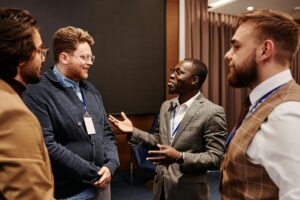With my colleagues at Mentorloop, I recently had the privilege of attending DDD Melbourne 2024, an inclusive non-profit conference for the Melbourne software community. The event brought together over 650 developers, tech enthusiasts, and industry experts to share knowledge, discuss trends, and explore new ideas.

The DDD Melbourne agenda was a treasure trove of diverse topics. Attendees could choose from sessions covering everything from functional programming challenges to web performance optimization. Whether you’re passionate about security, career growth, or the latest tech trends, there was something for everyone.
Choosing which sessions to attend at the conference was both exciting and challenging for me. I made sure to pick a variety of topics that interested me, from architecture to soft skills. I also focused on sessions that would help me in my job as a software engineer, such as improving code quality and learning about new frameworks. I listened to recommendations from other attendees and chose sessions that were generating a lot of buzz. I tried to strike a balance between sessions that went into technical details and ones that gave me a broader understanding of the topics.
In this article, I’d like to share some highlights from the conference that left a lasting impression.
Building a Culture of Healthy Conflict in Tech Teams
Speaker: Andrew Murphy
Andrew Murphy’s presentation on “Building a Culture of Healthy Conflict in Tech Teams” struck a chord with me. As developers, we often encounter disagreements and differing opinions. Andrew emphasized the importance of addressing these conflicts constructively. He explored how seemingly minor issues can escalate into full-blown conflicts in the workplace. By contrasting healthy conflict (where ideas win) with unhealthy conflict (where people win), Andrew provided practical insights for fostering a positive team environment.
In our fast-paced industry, where deadlines loom and codebases grow, it’s easy to shy away from conflict. But Andrew reminded us that healthy conflict is essential for growth. It encourages diverse perspectives, sparks innovation, and ultimately leads to better solutions.
An example of how this could arise within the Mentorloop team is during planning for upcoming releases. Engineers like myself always want to improve things like performance and scalability while designers focus on user experience and aesthetics. Tensions can rise as the team discusses the conflict in priorities but if handled healthily and productively, this can lead to a hybrid plan of attack where we arrive at iterative user interface enhancements that improve user experience while also making way for more substantial redesign and performance improvements.
It’s good to be reminded that it’s in these conflicts that innovation happens. Being open to considering seemingly conflicting ideas and priorities is what pushes us to reach solutions like balancing aesthetics and performance – something that exponentially improves user experience more than just working on improving one of those things in isolation.
As I reflect on this session, I’m inspired to approach disagreements with an open mind, seeking resolution rather than avoidance. We strive to do this in Mentorloop but it’s good to be mindful of encouraging and practising this behaviour so that we can avoid silos and collaborate more effectively. I welcome the reminder to see conflict as an event that can force critical evaluation, better-informed decisions, and innovation instead of something that needs to be avoided.
Choose Your Own Pen-Test Adventure!
Speakers: James Hercock and James Trotter
James Hercock and James Trotter took us on an exciting journey with their presentation titled “Choose Your Own Pen-Test Adventure!” They illustrated how a seemingly innocent mistake by a developer could lead to vulnerabilities that attackers might exploit. Their engaging storytelling approach highlighted the critical role developers play in securing systems. It was a reminder for all of us to be vigilant and proactive in our coding practices.
As developers, we’re entrusted with building robust software. The speakers reminded us that even a single oversight can have far-reaching consequences. At Mentorloop, we take security very seriously. We understand that there are many ways things could go wrong, and we want to make sure we’re always one step ahead of any possible threats. We’re aware that one undetected flaw in our system (e.g. a secret backdoor) could allow an attacker to gain access without us knowing, or that misconfigurations or unpatched vulnerabilities could be exploited.
Upon reflection, I’m glad to say that I’m confident in the steps that the entire Mentorloop team are taking to ensure that none of these scenarios ever happen.
Firstly, we have a thorough scoping process in place. This helps us define what’s in and out of bounds for testing. This way, we can identify any vulnerabilities before an attacker does. We also prioritize fixing critical issues first, so that there’s no chance of any secret backdoors being left open. Additionally, we conduct regular penetration testing to stay secure, and our team of engineers and security experts work together to ensure our systems are always up to date. Lastly, we make sure we learn from each test so that we can continuously improve and reinforce that we’re on the right path when it comes to security.
This session underscored the importance of thorough testing, secure coding practices, and ongoing vigilance which may sound basic but it is incredibly important to highlight regularly. I left this session with a renewed confidence in what our team at Mentorloop has done and continues to do, as well as a renewed commitment to writing code that not only functions but also stands up to scrutiny.
Continuous Improvement: Crafting the Habit of Self-Development
Speaker: Susan Brander
Susan Brander’s talk on “Continuous Improvement” resonated deeply with me. She emphasized the importance of self-development and goal monitoring. As developers, we often get caught up in the day-to-day tasks, but Susan reminded us to invest in our personal growth. I took note of her practical tips for creating habits around continuous learning as personal reminders. Whether it’s learning a new programming language, attending workshops, or reading technical blogs, Susan’s insights encouraged us to prioritize our growth.
Attending conferences like this is one of the ways we try to push ourselves towards continuous improvement here at Mentorloop, as well as holding inter-team competitions such as our recently concluded Hackathon. We also try our best within the team to always find opportunities to learn from and mentor each other. There’s always room to improve, but I’m glad that this is something that we prioritise at Mentorloop.
In the ever-evolving landscape of technology, complacency is our greatest enemy. Susan’s message was clear: Set goals, track progress, and embrace lifelong learning. As I jot down my own development goals, I’m grateful for her reminder that excellence isn’t a destination—it’s a journey.
Final Thoughts
As a member of the engineering team, I’m excited to share our experiences with the broader team and the Mentorloop community. From healthy conflict resolution to pen-test adventures and personal development, this conference reinforced our commitment to excellence in software development. It has also prompted me to reflect on how I’ve seen these concepts in practice in my professional life and at Mentorloop over the years.

I’ve seen positive shifts in how our teams handle conflict over the years. In the Product Team, we try our best to embrace healthy disagreements as opportunities for growth. Our team of engineers and designers actively endeavour to communicate differing viewpoints effectively, leading to better decisions. Although I’m confident that we collaborate effectively, I know we can improve our consistency in encouraging healthy conflict across all teams. As a team, we can share experiences, actively listen, and foster a better feedback culture.
I’ve also watched our security practices significantly improve over the years. Regular penetration testing keeps us vigilant, and collaboration between engineers and security experts ensures vulnerabilities are addressed promptly. Mentorloop prioritizes security as a shared responsibility, and our learning culture adapts defences based on each pen test. And while this is all good, I can see areas where we can improve. As a team, we can organize security workshops, encourage security-focused code reviews, and stay curious about emerging threats.
DDD Melbourne 2024 was a day filled with valuable insights, thought-provoking discussions, and networking opportunities. It was great to take time to reflect and revisit current practices and open myself up to what could be done better. I look forward to the next one and until next time, my team and I will keep coding, exploring, and pushing the boundaries of what’s possible! 🚀




